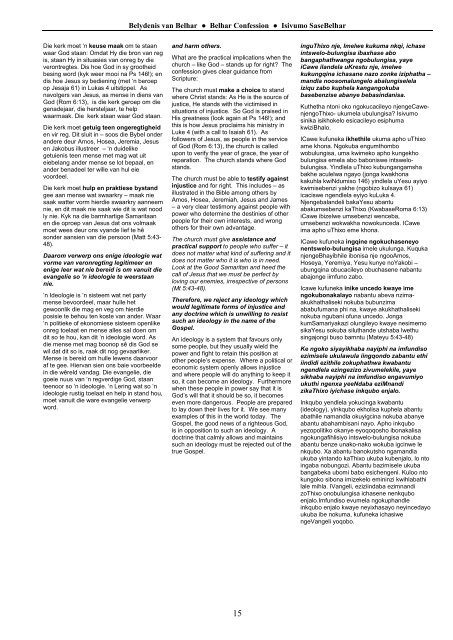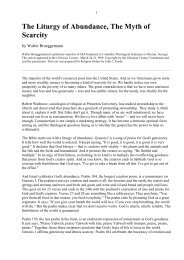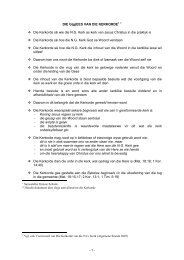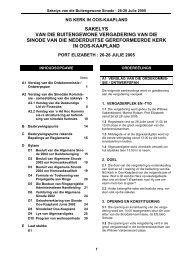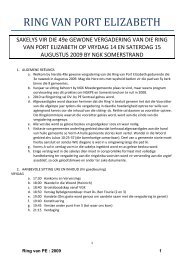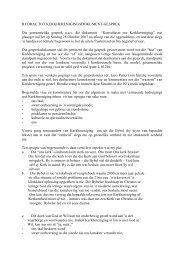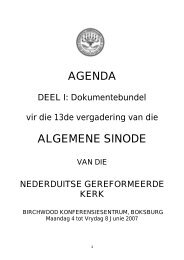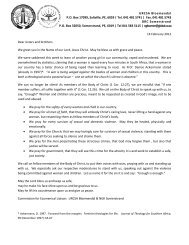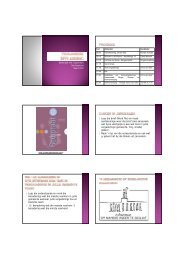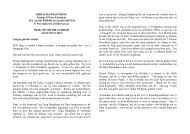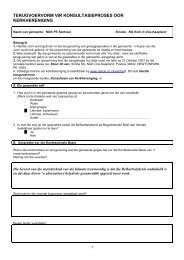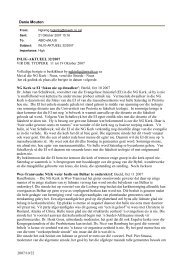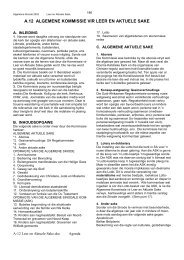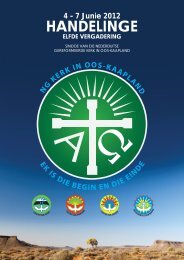BelharBelydenis - NG Kerk in Oos-Kaapland
BelharBelydenis - NG Kerk in Oos-Kaapland
BelharBelydenis - NG Kerk in Oos-Kaapland
You also want an ePaper? Increase the reach of your titles
YUMPU automatically turns print PDFs into web optimized ePapers that Google loves.
Die kerk moet ‘n keuse maak om te staan<br />
waar God staan: Omdat Hy die bron van reg<br />
is, staan Hy <strong>in</strong> situasies van onreg by die<br />
verontregtes. Dis hoe God <strong>in</strong> sy grootheid<br />
bes<strong>in</strong>g word (kyk weer mooi na Ps 146!); en<br />
dis hoe Jesus sy bedien<strong>in</strong>g (met ‘n beroep<br />
op Jesaja 61) <strong>in</strong> Lukas 4 uitstippel. As<br />
navolgers van Jesus, as mense <strong>in</strong> diens van<br />
God (Rom 6:13), is die kerk geroep om die<br />
genadejaar, die hersteljaar, te help<br />
waarmaak. Die kerk staan waar God staan.<br />
Die kerk moet getuig teen ongeregtigheid<br />
en vir reg. Dit sluit <strong>in</strong> – soos die Bybel onder<br />
andere deur Amos, Hosea, Jeremia, Jesus<br />
en Jakobus illustreer – ‘n duidelike<br />
getuienis teen mense met mag wat uit<br />
eiebelang ander mense se lot bepaal, en<br />
ander benadeel ter wille van hul eie<br />
voordeel.<br />
Die kerk moet hulp en praktiese bystand<br />
gee aan mense wat swaarkry – maak nie<br />
saak watter vorm hierdie swaarkry aanneem<br />
nie, en dit maak nie saak wie dit is wat nood<br />
ly nie. Kyk na die barmhartige Samaritaan<br />
en die oproep van Jesus dat ons volmaak<br />
moet wees deur ons vyande lief te hê<br />
sonder aansien van die persoon (Matt 5:43-<br />
48).<br />
Daarom verwerp ons enige ideologie wat<br />
vorme van veronregt<strong>in</strong>g legitimeer en<br />
enige leer wat nie bereid is om vanuit die<br />
evangelie so 'n ideologie te weerstaan<br />
nie.<br />
‘n Ideologie is ‘n sisteem wat net party<br />
mense bevoordeel, maar hulle het<br />
gewoonlik die mag en veg om hierdie<br />
posisie te behou ten koste van ander. Waar<br />
‘n politieke of ekonomiese sisteem openlike<br />
onreg toelaat en mense alles sal doen om<br />
dit so te hou, kan dit ‘n ideologie word. As<br />
die mense met mag boonop sê dis God se<br />
wil dat dit so is, raak dit nog gevaarliker.<br />
Mense is bereid om hulle lewens daarvoor<br />
af te gee. Hiervan sien ons baie voorbeelde<br />
<strong>in</strong> die wêreld vandag. Die evangelie, die<br />
goeie nuus van ‘n regverdige God, staan<br />
teenoor so ‘n ideologie. ‘n Ler<strong>in</strong>g wat so ‘n<br />
ideologie rustig toelaat en help <strong>in</strong> stand hou,<br />
moet vanuit die ware evangelie verwerp<br />
word.<br />
Belydenis van Belhar ● Belhar Confession ● Isivumo SaseBelhar<br />
and harm others.<br />
What are the practical implications when the<br />
church – like God – stands up for right? The<br />
confession gives clear guidance from<br />
Scripture:<br />
The church must make a choice to stand<br />
where Christ stands: As He is the source of<br />
justice, He stands with the victimised <strong>in</strong><br />
situations of <strong>in</strong>justice. So God is praised <strong>in</strong><br />
His greatness (look aga<strong>in</strong> at Ps 146!); and<br />
this is how Jesus proclaims his m<strong>in</strong>istry <strong>in</strong><br />
Luke 4 (with a call to Isaiah 61). As<br />
followers of Jesus, as people <strong>in</strong> the service<br />
of God (Rom 6:13), the church is called<br />
upon to verify the year of grace, the year of<br />
reparation. The church stands where God<br />
stands.<br />
The church must be able to testify aga<strong>in</strong>st<br />
<strong>in</strong>justice and for right. This <strong>in</strong>cludes – as<br />
illustrated <strong>in</strong> the Bible among others by<br />
Amos, Hosea, Jeremiah, Jesus and James<br />
– a very clear testimony aga<strong>in</strong>st people with<br />
power who determ<strong>in</strong>e the dest<strong>in</strong>ies of other<br />
people for their own <strong>in</strong>terests, and wrong<br />
others for their own advantage.<br />
The church must give assistance and<br />
practical support to people who suffer – it<br />
does not matter what k<strong>in</strong>d of suffer<strong>in</strong>g and it<br />
does not matter who it is who is <strong>in</strong> need.<br />
Look at the Good Samaritan and heed the<br />
call of Jesus that we must be perfect by<br />
lov<strong>in</strong>g our enemies, irrespective of persons<br />
(Mt 5:43-48).<br />
Therefore, we reject any ideology which<br />
would legitimate forms of <strong>in</strong>justice and<br />
any doctr<strong>in</strong>e which is unwill<strong>in</strong>g to resist<br />
such an ideology <strong>in</strong> the name of the<br />
Gospel.<br />
An ideology is a system that favours only<br />
some people, but they usually wield the<br />
power and fight to reta<strong>in</strong> this position at<br />
other people’s expense. Where a political or<br />
economic system openly allows <strong>in</strong>justice<br />
and where people will do anyth<strong>in</strong>g to keep it<br />
so, it can become an ideology. Furthermore<br />
when these people <strong>in</strong> power say that it is<br />
God’s will that it should be so, it becomes<br />
even more dangerous. People are prepared<br />
to lay down their lives for it. We see many<br />
examples of this <strong>in</strong> the world today. The<br />
Gospel, the good news of a righteous God,<br />
is <strong>in</strong> opposition to such an ideology. A<br />
doctr<strong>in</strong>e that calmly allows and ma<strong>in</strong>ta<strong>in</strong>s<br />
such an ideology must be rejected out of the<br />
true Gospel.<br />
15<br />
<strong>in</strong>guThixo nje, Imelwe kukuma nkqi, ichase<br />
<strong>in</strong>tswelo-bulungisa ibaxhase abo<br />
bangaphathwanga ngobulungisa, yaye<br />
iCawe ilandela uKrestu nje, imelwe<br />
kukungq<strong>in</strong>a ichasane nazo zonke iziphatha –<br />
mandla noosomalungelo abalungiselela<br />
iziqu zabo kuphela kangangokuba<br />
basebenzise abanye bebas<strong>in</strong>danisa.<br />
Kuthetha ntoni oko ngokucacileyo njengeCawenjengoThixo-<br />
ukumela ubulungisa? Isivumo<br />
s<strong>in</strong>ika isikhokelo esicacileyo esiphuma<br />
kwiziBhalo.<br />
ICawe kufuneka ikhethile ukuma apho uThixo<br />
ame khona. Ngokuba engumthombo<br />
wobulungisa, uma kwimeko apho kungekho<br />
bulungisa emela abo baboniswe <strong>in</strong>tswelobulungisa.<br />
Y<strong>in</strong>dlela uThixo kubungangamsha<br />
bakhe aculelwa ngayo (jonga kwakhona<br />
kakuhla kwiNdumiso 146) y<strong>in</strong>dlela uYesu ayiyo<br />
kwimisebenzi yakhe (ngobizo kuIsaya 61)<br />
icaciswe ngendlela eyiyo kuLuka 4.<br />
Njengebalandeli bakaYesu abantu<br />
abakumsebenzi kaThixo (KwabaseRoma 6:13)<br />
iCawe ibizelwe umsebenzi wenceba,<br />
umsebenzi wokwakha nowokunceda. ICawe<br />
ima apho uThixo eme khona.<br />
ICawe kufuneka <strong>in</strong>gq<strong>in</strong>e ngokuchaseneyo<br />
nentswelo-bulungisa imele ukulunga. Kuquka<br />
njengeBhayibhile ibonisa nje ngooAmos,<br />
Hoseya, Yeremiya, Yesu kunye noYakobi –<br />
ubungq<strong>in</strong>a obucacileyo obuchasene nabantu<br />
abajonge iimfuno zabo.<br />
Icawe kufuneka <strong>in</strong>ike uncedo kwaye ime<br />
ngokubonakalayo nabantu abeva nzima-<br />
akukhathaliseki nokuba bubunzima<br />
ababufumana phi na, kwaye akukhathaliseki<br />
nokuba ngubani ofuna uncedo. Jonga<br />
kumSamariyakazi olungileyo kwaye nesimemo<br />
sikaYesu sokuba siluthande utshaba lwethu<br />
s<strong>in</strong>gajongi buso bamntu (Mateyu 5:43-48)<br />
Ke ngoko siyayikhaba nayiphi na imfundiso<br />
ezimisele ukulawula i<strong>in</strong>gqondo zabantu ethi<br />
i<strong>in</strong>didi ezithile zokuphathwa kwabantu<br />
ngendlela ez<strong>in</strong>gezizo zivumelekile, yaye<br />
sikhaba nayiphi na imfundiso engavumiyo<br />
ukuthi ngenxa yeeNdaba eziMnandi<br />
zikaThixo iyichase <strong>in</strong>kqubo enjalo.<br />
Inkqubo yendlela yokuc<strong>in</strong>ga kwabantu<br />
(ideology), y<strong>in</strong>kqubo ekholisa kuphela abantu<br />
abathile namandla okuyigc<strong>in</strong>a nokuba abanye<br />
abantu abahambisani nayo. Apho <strong>in</strong>kqubo<br />
yezopolitiko okanye eyoqoqosho ibonakalisa<br />
ngokungafihlisiyo <strong>in</strong>tswelo-bulungisa nokuba<br />
abantu benze unako-nako wokuba igc<strong>in</strong>we le<br />
nkqubo. Xa abantu banokutsho ngamandla<br />
ukuba y<strong>in</strong>tando kaThixo ukuba kubenjalo, lo nto<br />
<strong>in</strong>gaba nobungozi. Abantu bazimisele ukuba<br />
bangabeka ubomi babo esichengeni. Kuloo nto<br />
kungoko sibona imizekelo em<strong>in</strong><strong>in</strong>zi kwihlabathi<br />
lale mihla. IVangeli, ezizi<strong>in</strong>daba ezimnandi<br />
zoThixo onobulungisa ichasene nenkqubo<br />
enjalo.Imfundiso evumela ngokuphandle<br />
<strong>in</strong>kqubo enjalo kwaye neyixhasayo ney<strong>in</strong>cedayo<br />
ukuba ibe nokuma, kufuneka ichasiwe<br />
ngeVangeli yoqobo.


